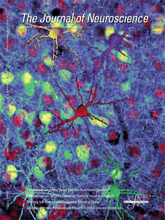 | |
| Discipline | Neuroscience |
|---|---|
| Language | English |
| Edited by | Sabine Kastner |
| Publication details | |
| History | 1981–present |
| Publisher | Society for Neuroscience (United States) |
| Frequency | Weekly |
| 4.0 (2024) | |
| Standard abbreviations | |
| ISO 4 | J. Neurosci. |
| Indexing | |
| CODEN | JNRSDS |
| ISSN | 0270-6474 (print) 1529-2401 (web) |
| LCCN | 81640907 |
| OCLC no. | 476317794 |
| Links | |
The Journal of Neuroscience is a weekly peer-reviewed scientific journal published by the Society for Neuroscience (SfN). It covers empirical research on all aspects of neuroscience. Its editor-in-chief is Sabine Kastner (Princeton University), who succeeded Marina Picciotto (Yale University) in 2024. According to the latest Journal Citation Reports , the journal has a 2024 impact factor of 4.0. [1]